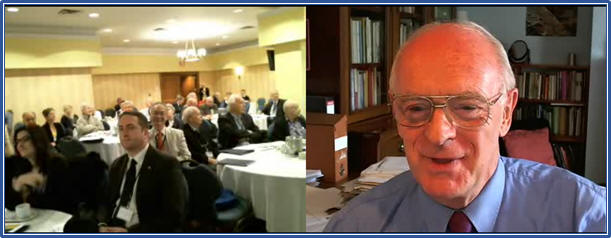|
 |
Sensitivity, Non-Linearity & Self-Amplification
in the
Global Climate System |
The presentation was delivered from his London base by David Wasdell, Director of the Apollo-Gaia Project,
on the 20th September 2013, to the Annual Conference of the Club of Rome, which took place in Ottawa. High definition, interactive,
video-conferencing facilities were used to minimise the carbon footprint of the occasion (an innovation both
for the presenter and for the Club of Rome itself.) Information regarding the Club of Rome can be found here.
Click on the image to experience the video-recording of this historic event |
 |
| (The video opens in the OnSync video conferencing platform. The audio quality in the presentation London → Ottawa is excellent. However Ottawa → London is poor. The
content is transcribed in the PDF. Unfortunately, the screen pointer used during the presentation did not record.) |
| |
| The whole presentation, together with introduction, Q & A session and vote of thanks,
has been turned into a fully illustrated PDF which can be viewed or downloaded here: |
 |
| (The immediacy of spoken English has been maintained in the PDF, with only a minimum
of editing for sense and clarity. The core analysis was presented in July 2012 at the 4th Global Conference
on Global Warming in Istanbul. A revised version of that presentation in academic format is available
here.) |
Executive Summary |
Following an introduction to the technology and a brief background to the Apollo-Gaia Project,
the presentation outlined a comprehensive conceptual model of the feedback dynamics of the planetary climate system.
Initial attempts to derive a value for the Earth System Sensitivity using this approach were abandoned due to the
large uncertainties introduced by quantification of the various feedback mechanisms, their complex interactions
and the inertia of the global dynamics
A new and powerful interdisciplinary approach, based on paleo-data, was presented. It produced a value for the Earth System Sensitivity
significantly higher and with less uncertainty than is possible with the current ensemble of climate models used
in the 5th Assessment Report of the IPCC. (7.8°C at eventual equilibrium in response to a doubling of the atmospheric
concentration of CO2, in contrast to the conservative current estimate of c. 3°C). Key implications
of the new value were reviewed: |
| * | Temperature rise to which we are already committed. |
| * | Realistically safe level of CO2 concentration. |
| * | Temperature rise to be expected at so-called "safe" concentration of 440 ppm. |
| * | Collapse of budget approach for current international negotiations. |
| * | Rise in temperature associated with current set of commitments to decarbonisation. |
| |
The next section introduced an innovative analysis of the non-linear relationship between Sensitivity and the strength of the Feedback Factor.
This showed why, with the current model simulation of feedback dynamics, changes in understanding of the Feedback Factor
have small effects on the value of Sensitivity. However, at the value of the Feedback Factor associated with the Earth System Sensitivity,
small increases in the Feedback Factor have progressively large effects on outcome temperature.
The value for the Earth System Sensitivity was derived from historic conditions of very slow change in a state of dynamic near-equilibrium.
Those conditions do not apply in the Anthropocene. Change is comparatively rapid and the Earth System is significantly out of equilibrium state.
In this new and developing situation emergent behaviours increase the value of the Feedback Factor, reducing the small remaining buffer
between the comparative security of equilibrating climate behaviour and the critical threshold ("tipping point")
that marks the onset of self-amplification (runaway behaviour) in the global climate system.
The main analysis ended with the statement: |
"The solutions that we provide must not be determined by the conservative set of our computer modelling
but by the reality of the way the earth system behaves and particularly under the conditions beyond the stable state in which
we find ourselves." |
| The epilogue to the presentation underlined the current state of planetary emergency. Achievement of climate stabilisation faces us with
the strategic imperative to move beyond a low carbon economy (postulated as a solution by our current global climate models) and to
achieve a carbon draw-down economy at a global level in the shortest possible time. The transition would require a phase change in social dynamics,
illustrated as a transition from super-tanker to shoal. The epilogue concluded with a dream for the future (with acknowledgement to Martin Luther King): |
I have a dream: that humanity will break out of its state of denial and find the courage to face the harsh realities of now.
I have a dream: that we will rise up and overthrow the collusional power of political and economic vested interests.
I have a dream: that we will acknowledge the life-destroying gravity of our addiction to the dark energy of yesterday, to kick the habit
of our fossil dependency, and to succeed in the task of system de-toxification.
I have a dream: that we will repudiate the myth of eternal growth, and learn to live sustainably within the limits of our finite world;
that we will find a way to stabilise the climate of planet earth before temperatures rise too high;
that we will find a way to abort the extinction event of the Anthropocene before it grows to catastrophic proportions.
I have a dream: that as a species we will look back on the current crisis and celebrate the solutions we were able to put in place and say with pride "that was humanity's finest hour!"
|
| * * * * * * * |
| During the following Q & A session, the presenter was asked how his conclusions relate to the 5th Assessment
Report of the IPCC due to be published in Stockholm exactly one week later.
His response concluded with the words: |
"The IPCC report, in so far as it goes, is absolutely solid.
However in terms of whether it is fit for purpose as a ground for strategic policy-making,
the answer is 'no, it is not fit for purpose' for the reasons that I have outlined.
It is a foundation, but we need to work with an understanding of the problematique that
we face, that is to do with the reality of the system in which we live, not a conservative
computer model of that reality that doesn't do justice to the crisis."
|
|

